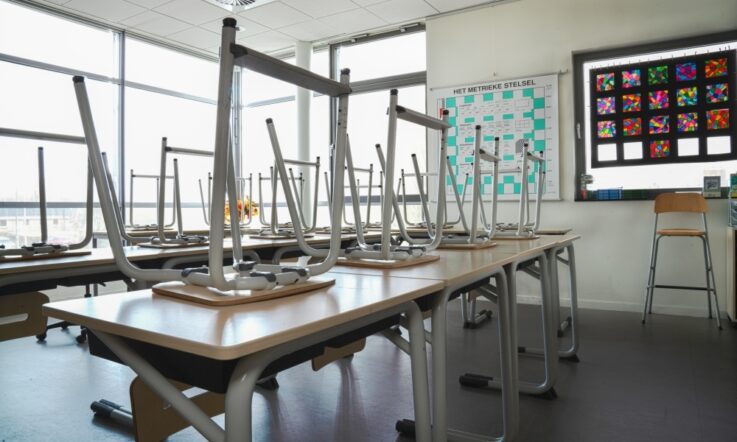This podcast from Teacher magazine is supported by the Quality Teaching Academy. The Quality Teaching Academy empowers teachers to enrich student learning. The Academy delivers high impact professional development, including the evidence-backed Quality Teaching Rounds, and supports a community of educators with a shared vision for quality teaching. Visit qtacademy.edu.au
Thanks for listening to this episode of Teacher Staffroom, where we catch you up on the latest evidence, insight, and action. I'm Rebecca Vukovic.
The term ‘evidence-based practice’ is widely used in education. Schools are presented with strategies, programs and approaches that claim to be ‘research-based’ or ‘evidence-based’. But what is evidence-based practice? And, how do schools determine which of these programs and methods have solid foundations in research? These questions have been explored in several articles and podcasts on Teacher this month. Throughout this episode, I’ll be taking a deeper dive to explore some of the key messages to come from these pieces. I’ll also highlight some of the contributions we’ve published, as well as some of my favourites pieces to be featured on Teacher this month. I’d be keen to hear if these were some of yours as well, as well as any general feedback you may have, so please leave a comment on the transcript of this podcast on the Teacher magazine website, or rate and review us in your favourite podcast app. Okay, let’s get started.
I know as educators you hear the term evidence-based practice all the time – in your professional reading, in meetings, during professional development, at conferences … the list goes on. But, how do you determine what approaches actually have solid foundations in research? I wrote a piece this month that explored this issue, including how to gather evidence to understand student needs and to support effective practice. You can read the full article on the Teacher magazine website.
Still on the topic of evidence-based practice, my colleague Dominique Russell recorded a podcast with the research team for the Monash Q Project – a five year partnership between Monash University and the Paul Ramsey Foundation with the broader aim of improving the use of research evidence in schools.
Last year, the Monash Q Project surveyed almost 500 practitioners from 414 schools across New South Wales, Victoria, South Australia and Queensland to understand how Australian educators find and use research and evidence in their practice.
They found 83 per cent of educators believe that using research will help improve student outcomes; but 45 per cent believe that their schools do not support the use of research by making enough time available. In addition, 32 per cent of educators do not feel confident to analyse and interpret research.
Dominique interviewed Jo Gleeson, a Research Fellow on the Q Project, and Lucas Walsh, a Professor of Youth Policy and Education Practice, and one of the chief investigators on the Q Project. Here’s Jo discussing the importance of context when it comes to the use of research in schools.
Teachers and school leaders are telling us very, very loudly, that: ‘if the research is not suited to my context, or I can’t adapt it for my context, I won’t use it’. And, in fact, it can act very much as a deterrent to using it in the future.
So when we talk about appropriate evidence, we’re not trying to get into debates about, you know, has it gone through some trial versus something else? Yes, we want good, credible evidence, but we absolutely are highlighting the importance of context – and that does enable it. And somehow, part of what we want to do is, how do we help to get realistic, usable, context-fitting, research into the hands of teachers?
Here’s something to think about:
As a school leader, reflect on how the quality use of research is prioritised in your school community. How could your entire school community improve when it comes using research to inform and improve practice?
And my final piece, still on the topic of evidence in education, is an article written by University of Queensland colleagues Stephanie MacMahon, Jack Leggett and Annemaree Carroll, on building a bridge between research and educational practice. They say that translating academic research into classroom practice is traditionally a one-way relationship – from research to practice – but they’ve been working in collaboration with educators to bridge the research-practice gap and make translation a two-way process of engagement.
You’ll find these pieces and everything I mention in today’s episode in the transcript of this podcast on the Teacher magazine website.
Moving on now, I’d like to highlight two key contributions we published on Teacher this month. The first, is a column from Professor Geoff Masters where he explores why there is such a mismatch between parents’ beliefs in their child’s learning, and how ready the child is for the year’s curriculum. Masters says that grades are poor indicators of where students are in their long-term learning progress, because grades are always specific to a particular piece of work or a particular course of learning.
Here’s a quote from the column:
Grades rarely provide detail that parents can use to support their children’s learning. This is because grades do not indicate the points individuals have reached in their long-term progress. Instead, they are performance ratings on year-level expectations and, as such, often leave parents unclear about their substantive meaning (for example, the distinction between ‘Developing’ and ‘Emerging’, or between ‘C’ and ‘D’). A more useful report might identify the stages individuals have reached in their learning; explain what this means in terms of their current levels of knowledge, understanding and skill; and make suggestions for appropriate next steps in each student’s learning and what parents might do to assist.
The other contribution I wanted to share with you was penned by Professor Jenny Gore from the University of Newcastle. It explores the impact of COVID-19 on teacher morale and why there must be a focus on helping teachers recover from the pandemic. In the article, Gore wrote:
At times during the pandemic, the status of teachers appeared to be just below that of nurses and doctors on the ‘frontline’. When other people were ordered to work from home and keep their children home if they could, most teachers were expected to be at school, caring for the children of essential workers and delivering lessons face-to-face, via paper and online. Teachers quickly pivoted to and from modes of learning and there are countless stories of heroic efforts as teachers delivered material to homes, made phone calls and provided other support for children and their families. This is testament to the commitment they have to their students. However, the increased and complex workload took its toll. Our research shows that teacher morale was significantly lower in 2020 than in 2019, and lower at the end of 2020 than at the start – a pattern not found in 2019 (Gore et al,. 2020). As a so-called caring profession, teachers’ capacity to sustain this level of work and commitment over the long term could be compromised if their morale does not lift.
Here’s something to think about and discuss with your colleagues in education.
As a school leader, have you gathered feedback from staff about their experience of teaching and learning during COVID-19? How has the pandemic affected their welfare and morale? How can this knowledge inform your professional learning and staff support planning?
Next, I’d like to run you through some of my favourite pieces of content to be published on Teacher this month. I’ll give you a brief description of each but remember, if you’d like to read the full article, or even some of the further readings on each of the topics, head on over to teachermagazine.com where you’ll find everything I’ve mentioned today.
Okay so when you think back to the novels and texts you studied in high school English, several names probably come to mind – Shakespeare, Orwell, Austin, Salinger or Dickens. But, are students today studying the same texts that we did all those years ago? A research project has analysed the text lists for the Senior Victorian English curriculum between 2010 and 2019. In a recent video on Teacher, we took a look at the diversity in text type, story setting, exploration of themes, and other characteristics of these texts.
Another piece I found really interesting was an infographic we published that explored US data on public school teachers working a second job outside the education system. It looked at what proportion of full-time teachers worked a second job, the type of jobs they did, and what their average earnings were.
The next piece is an article about Year 7 students from Townsville State High School who have been taking part in a hands-on inquiry into the science of the woomera – an Australian Aboriginal spear-throwing device. My editor Jo Earp gained insights from Year 12 Coordinator and science teacher Braden Askin and Head of Science Sarah Chapman, as well as cultural expert Les Tanna to put this piece together.
And finally, you may have heard that registrations are now open for this year’s Australian STEM Video Game Challenge. Students are encouraged to design creative, engaging and imaginative video games incorporating the 2021 theme, ‘scale’. We published a piece that discussed how students can go about approaching the theme this year, and the resources available for teachers.
That's all for this episode, and you're now all caught up on the latest evidence, insight and action. Before I let you go, I thought I’d give you a bit of a sneak peek of the next episode to be published in our Research Files series. In the episode, we dissect a new study which has identified some of the common challenges faced by casual relief teachers working in primary schools in Australia, and how school leaders can best support the casual relief teachers working in their schools. You’ll find our podcasts on all the major platforms, including Spotify, so follow our channel to make sure you never miss an episode.
You’ve been listening to a podcast from Teacher magazine supported by the Quality Teaching Academy. Academy members can access discounted professional development, including the rigorously-tested Quality Teaching Rounds, as well as a range of other great resources, videos, research and more. Get priority access to research and resources at qtacademy.edu.au



